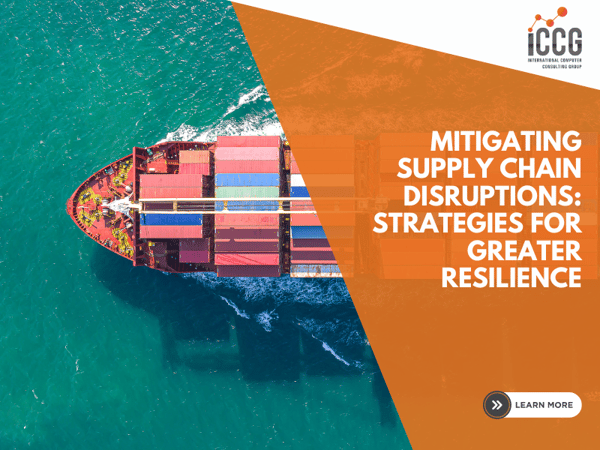Recently, Will Quinn, Global Director of Strategy, WMS, for our partner Infor, wrote this blog dedicated to strengthening supply chain resilience and mitigating disruptions. As manufacturing, distribution, and logistics leaders, you know the critical importance of a well-managed supply chain for organizational success, so we have decided to share this with you. However, disruptions—unexpected events that disrupt the flow of goods and services—are inevitable and can have significant impacts, such as shipping delays, increased costs, and revenue loss, ultimately affecting your bottom line and customer satisfaction.
The blog aims to provide comprehensive insights into supply chain risk mitigation strategies and explores critical approaches, including nearshoring, redundancy creation, investment in visibility software, and effective inventory management. It aims to guide you in navigating disruptions and establishing a resilient, disruption-proof supply chain.

In recent years, Will observed various disruptions impacting global supply chains. Here are some noteworthy examples:
-
Baltimore Bridge Collapse (March 2024):
- This event disrupted car and auto parts flow, potentially causing shortages in goods delivered through Baltimore.
- Ripple Effects:
- Increased shipping costs due to rerouting of cargo through other ports.
- Delays affecting manufacturers and consumers reliant on parts shipped through Baltimore.
- Potential job losses in the Baltimore port industry.
- Recovery involves rebuilding the bridge and restoring shipping capacity, impacting supply chains for an extended period.
-
Geopolitical Conflicts and Security Concerns:
- These conflicts disrupt trade routes, increase shipping insurance costs, and lead to material shortages.
- Examples include the Russia-Ukraine war impacting wheat, metals, and energy supplies, and tensions in the South China Sea affecting vital shipping lanes.
- Uncertainties make it challenging for businesses to plan and manage supply chains effectively.
-
Cyberattacks and Data Breaches:
- Operational disruptions and data breaches expose sensitive information, potentially leading to financial losses.
- Recent attacks like NotPetya, SolarWinds, and the Colonial Pipeline ransomware highlight vulnerabilities.
- Mitigation involves implementing strong cybersecurity measures, regular backups, and incident response plans.
-
Natural Disasters:
- Infrastructure damage, transportation disruptions, and power outages hinder production and distribution.
- Events like earthquakes, hurricanes (Katrina, Harvey), wildfires (California), and freezes (Texas) demonstrate the susceptibility of supply chains to natural disasters.
- Preparation includes risk assessments, supply chain diversification, and disaster recovery plans.
-
Labor Shortages and Strikes:
- Difficulty in staffing key positions leads to production slowdowns and potential price increases.
- Solutions include improving wages, automation to increase productivity, and fostering a skilled workforce.
-
Suez Canal Blockage (March 2021):
- A six-day blockage of this vital shipping lane caused a massive traffic jam and global delivery delays.
- Investing in infrastructure improvements and exploring alternative shipping routes can reduce future impacts.
-
Brexit (2020):
- New customs procedures and regulations caused trade delays and increased costs for businesses trading between the UK and EU.
- Transparent and predictable trade policies are crucial for smooth supply chain operations.
-
COVID-19 Pandemic (2020—2023):
- Widespread lockdowns, factory closures, labor shortages, and transportation bottlenecks disrupted global supply chains across electronics, automotive, and consumer goods sectors.
- Building adaptable and resilient supply chains is essential in a world with ongoing disruptions.
Understanding these disruptions and their impacts is the first step toward developing effective mitigation strategies and building supply chain resilience.
Stay tuned for upcoming blogs where Will delves deeper into these strategies, exploring nearshoring, redundancy creation, visibility software investment, effective inventory management, and more! Stay tuned for this journey toward a more resilient and disruption-proof supply chain.
As always, contact ICCG to help provide you with insight and information.
Schedule a complimentary consultation to review your questions.

